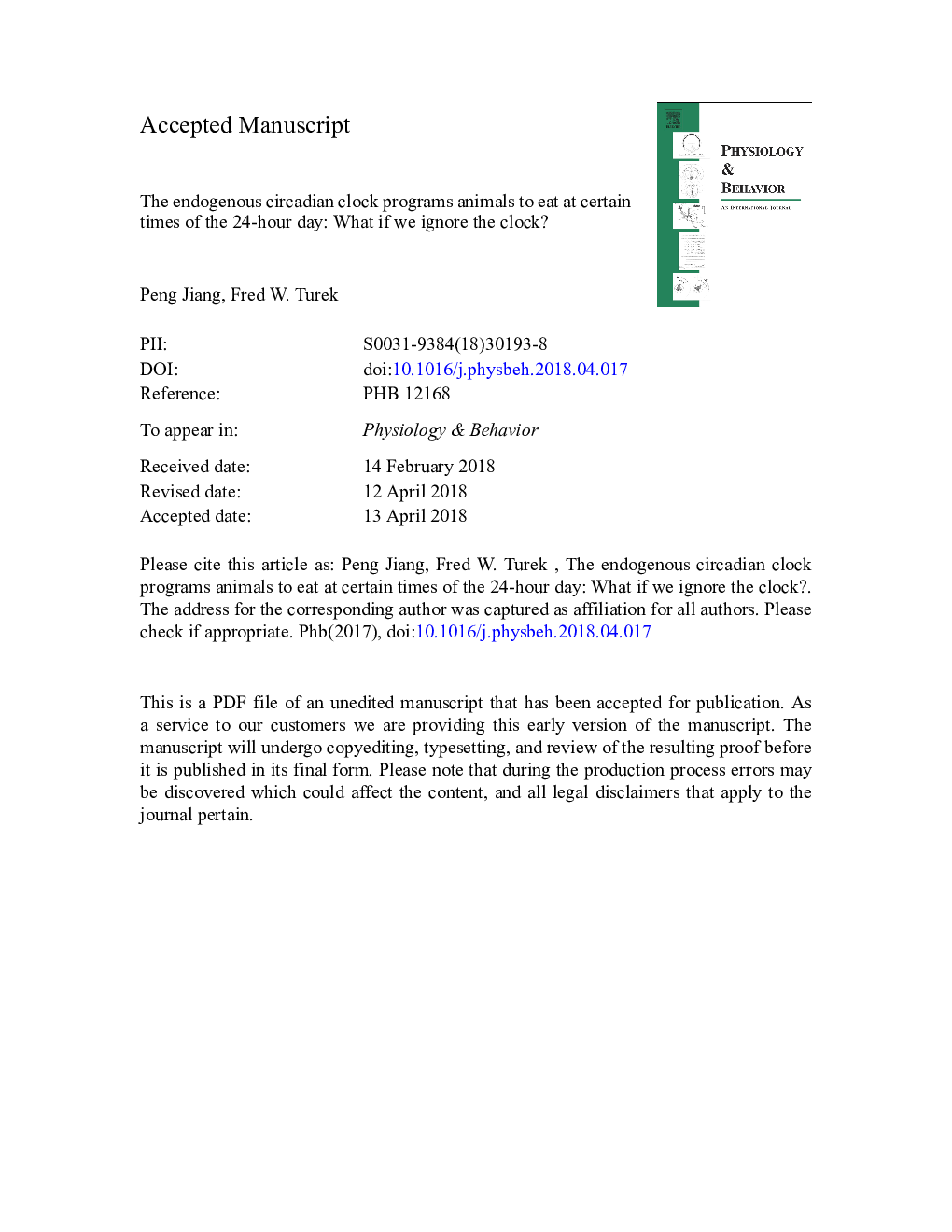| کد مقاله | کد نشریه | سال انتشار | مقاله انگلیسی | نسخه تمام متن |
|---|---|---|---|---|
| 8650371 | 1571125 | 2018 | 26 صفحه PDF | دانلود رایگان |
عنوان انگلیسی مقاله ISI
The endogenous circadian clock programs animals to eat at certain times of the 24-hour day: What if we ignore the clock?
ترجمه فارسی عنوان
برنامه ساعت های شبانه روزانه، حیوانات را در زمانهای خاصی از روز 24 ساعته بخورید: اگر ساعت را نادیده بگیرید، چه می شود؟
دانلود مقاله + سفارش ترجمه
دانلود مقاله ISI انگلیسی
رایگان برای ایرانیان
کلمات کلیدی
ساعت دیجیتال، متابولیسم انرژی، چاقی، دیابت،
ترجمه چکیده
کشف مکانیزم های مولکولی که در زیر ساعت های شبانه روزی قرار دارند، که در تقریبا هر سلول در سراسر بدن عمل می کند تا هماهنگی فرایندهای بیولوژیکی را برای پیش بینی و بهتر سازگار با تغییرات ریتمیک روزانه در محیط زیست، یکی از مهمترین دستاوردهای زیست پزشکی در قرن بیستم است. بیست سال پس از این پیشرفت، جامعه زیست پزشکی اکنون در مرز جدید قرار دارد تا مکانیزم های ساعت دیجیتال را در بسیاری از زمینه های تحقیقاتی در زمینه پزشکی به کار ببرد، چرا که مطالعات نشان می دهد که نقش مهم ساعت دیجیتال در طیف گسترده ای از عملکرد و بیماری های بیولوژیکی دارد. خط مقدم این منطقه هیجان انگیز، تحقیق تعاملات بین متابولیسم ساعت و انرژی است. در این بررسی، ما خلاصه ای از مطالعات حیوانی و انسانی می پردازیم که اختلالات ساعت دیجیتال یا محیط زیست یا ژنتیکی، اختلالات متابولیکی مربوط به چاقی، دیابت و سایر اختلالات متابولیکی را مرتبط می کند. ما همچنین درباره اینکه چگونه این پیشرفت ها در زیست شناسی روزانه می تواند راه را برای انقلابی در عمل بالینی در دوران پزشکی دقیق، هماهنگ کند.
موضوعات مرتبط
علوم زیستی و بیوفناوری
بیوشیمی، ژنتیک و زیست شناسی مولکولی
فیزیولوژی
چکیده انگلیسی
The discovery of the molecular mechanisms underlying the circadian clock, which functions in virtually every cell throughout the body to coordinate biological processes to anticipate and better adapt to daily rhythmic changes in the environment, is one of the major biomedical breakthroughs in the 20th century. Twenty years after this breakthrough, the biomedical community is now at a new frontier to incorporate the circadian clock mechanisms into many areas of biomedical research, as studies continue to reveal an important role of the circadian clock in a wide range of biological functions and diseases. A forefront of this exciting area is the research of interactions between the clock and energy metabolism. In this review, we summarize animal and human studies linking disruptions of the circadian clock, either environmental or genetic, to metabolic dysfunctions associated with obesity, diabetes, and other metabolic disorders. We also discuss how these advances in circadian biology may pave the way to revolutionize clinical practice in the era of precision medicine.
ناشر
Database: Elsevier - ScienceDirect (ساینس دایرکت)
Journal: Physiology & Behavior - Volume 193, Part B, 1 September 2018, Pages 211-217
Journal: Physiology & Behavior - Volume 193, Part B, 1 September 2018, Pages 211-217
نویسندگان
Peng Jiang, Fred W. Turek,
